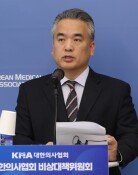Inter-Korean talks as a bridge connecting N. Korea and U.S.
Inter-Korean talks as a bridge connecting N. Korea and U.S.
Posted September. 07, 2018 08:09,
Updated September. 07, 2018 08:09
There was no breakthrough. There was nothing significant in North Korea’s position that was delivered by South Korean President Moon Jae-in’s special envoy to Pyongyang to recover denuclearization negotiation between North Korea and the United States. North Korean leader Kim Jong Un argued that its preemptive measures such as the abandonment of nuclear test sites should be greeted by corresponding measures by the United States such as the declaration of the end of the June 25 Korean War. Amidst this atmosphere, the two Koreas decided to have the third summit, which is to be held in Pyongyang, from Sept. 18-20. They also agreed to establish an inter-Korean liaison office prior to the summit.
According to South Korea’s National Security Adviser Chung Eui-yong on Thursday, Kim Jong Un said that he is able to continue more active measures for denuclearization once actions that corresponds to North Korea’s preemptive measures are taken. Kim also said that he would realize denuclearization within U.S. President Donald Trump's first term. “It is our firm position to make the Chosun Peninsula a peaceful place free from nuclear weapons and nuclear threats,” reported North Korea’s Chosun Central News Agency.
Although the leader of the hermit nation repeatedly emphasized its "firm denuclearization will," this is conditional, provided that the United States engages in corresponding measures according to the principle of simultaneous action. Of course, it is the first time for North Korean media to disclose Kim’s remarks over denuclearization. It can be assessed that the fact that his remarks on denuclearization, albeit not in his voice, was reported per se is a great progress when considering that the phrase "complete denuclearization" in joint statements of inter-Korean or North Korea-U.S. summits was all there was.
However, what is different is that that was all. The North Korean leader's will for denuclearization was not so much different from what he told the South Korean special envoy that first visited the North six months ago, saying, “There are no reasons for North Korea to possess nuclear weapons if North Korea’s regime is guaranteed.” Rather, the North’s remark this time appears to be a message urging compensation towards the United States, such as declaration of the end of the war or alleviation of sanctions, claiming that North Korea and the United States should work hand-in-hand.
Chung delivered that Kim Jong Un expressed his frustration over the international society, which doubts North Korea even though it engaged in "preemptive measures in good faith" such as permanently disabling the Punggye-ri nuclear test site. That is, the young North Korea leader is dissatisfied that there is no compensation. North Korea, however, already received ample compensation with the suspension of South Korea–U.S. joint military training. It is now North Korea’s turn to implement substantial measures by submitting its list of nuclear weapons and facilities and to suspend the production of nuclear materials in nuclear reactors and uranium enrichment facilities. Nonetheless, Kim Jong Un is actually rejecting to embark on the denuclearization process, requesting corresponding actions.
Indeed, the two Koreas must have discussed specific measures to recover North Korea-U.S. negotiations. President Trump recently asked his South Korean counterpart Moon Jae-in over a phone call to take the roll of a "chief negotiator." The South Korean special envoy must have suggested a solution of its own. As much as Chung Ui-yong revealed that there is a message towards the United States from the North that cannot be made public, the negotiation between the two countries may resume. The North Korea-U.S. negotiation, however, will travel on a rocky road, as long as there is doubt over Kim Jong Un’s sincerity.
There is not enough time before the upcoming inter-Korean summit. Conditions for resuming working-level negotiations between North Korea and the United States should be made at the least. Unless that is achieved, controversies on overspeeding relationship between South Korea and North Korea is unavoidable. There are voices within the South Korean administration that a progress in inter-Korean relationship may lead denuclearization. It is concerning that such atmosphere may result in turning the third inter-Korean summit into an event that receives cold shoulders. Even if the relationship between the two Koreas are heading ahead, it should be a distance that can lead the North Korea-U.S. relationship.







